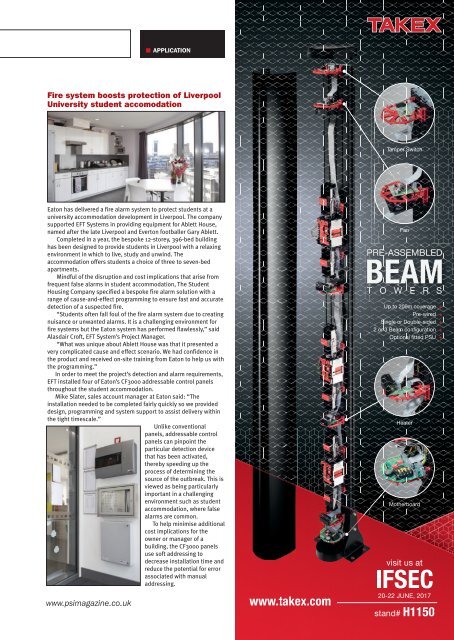PSI June2017
Create successful ePaper yourself
Turn your PDF publications into a flip-book with our unique Google optimized e-Paper software.
APPLICATION<br />
Fire system boosts protection of Liverpool<br />
University student accomodation<br />
Eaton has delivered a fire alarm system to protect students at a<br />
university accommodation development in Liverpool. The company<br />
supported EFT Systems in providing equipment for Ablett House,<br />
named after the late Liverpool and Everton footballer Gary Ablett.<br />
Completed in a year, the bespoke 12-storey, 396-bed building<br />
has been designed to provide students in Liverpool with a relaxing<br />
environment in which to live, study and unwind. The<br />
accommodation offers students a choice of three to seven-bed<br />
apartments.<br />
Mindful of the disruption and cost implications that arise from<br />
frequent false alarms in student accommodation, The Student<br />
Housing Company specified a bespoke fire alarm solution with a<br />
range of cause-and-effect programming to ensure fast and accurate<br />
detection of a suspected fire.<br />
“Students often fall foul of the fire alarm system due to creating<br />
nuisance or unwanted alarms. It is a challenging environment for<br />
fire systems but the Eaton system has performed flawlessly,” said<br />
Alasdair Croft, EFT System’s Project Manager.<br />
“What was unique about Ablett House was that it presented a<br />
very complicated cause and effect scenario. We had confidence in<br />
the product and received on-site training from Eaton to help us with<br />
the programming.”<br />
In order to meet the project’s detection and alarm requirements,<br />
EFT installed four of Eaton’s CF3000 addressable control panels<br />
throughout the student accommodation.<br />
Mike Slater, sales account manager at Eaton said: “The<br />
installation needed to be completed fairly quickly so we provided<br />
design, programming and system support to assist delivery within<br />
the tight timescale.”<br />
Unlike conventional<br />
panels, addressable control<br />
panels can pinpoint the<br />
particular detection device<br />
that has been activated,<br />
thereby speeding up the<br />
process of determining the<br />
source of the outbreak. This is<br />
viewed as being particularly<br />
important in a challenging<br />
environment such as student<br />
accommodation, where false<br />
alarms are common.<br />
To help minimise additional<br />
cost implications for the<br />
owner or manager of a<br />
building, the CF3000 panels<br />
use soft addressing to<br />
decrease installation time and<br />
reduce the potential for error<br />
associated with manual<br />
addressing.<br />
www.psimagazine.co.uk

















